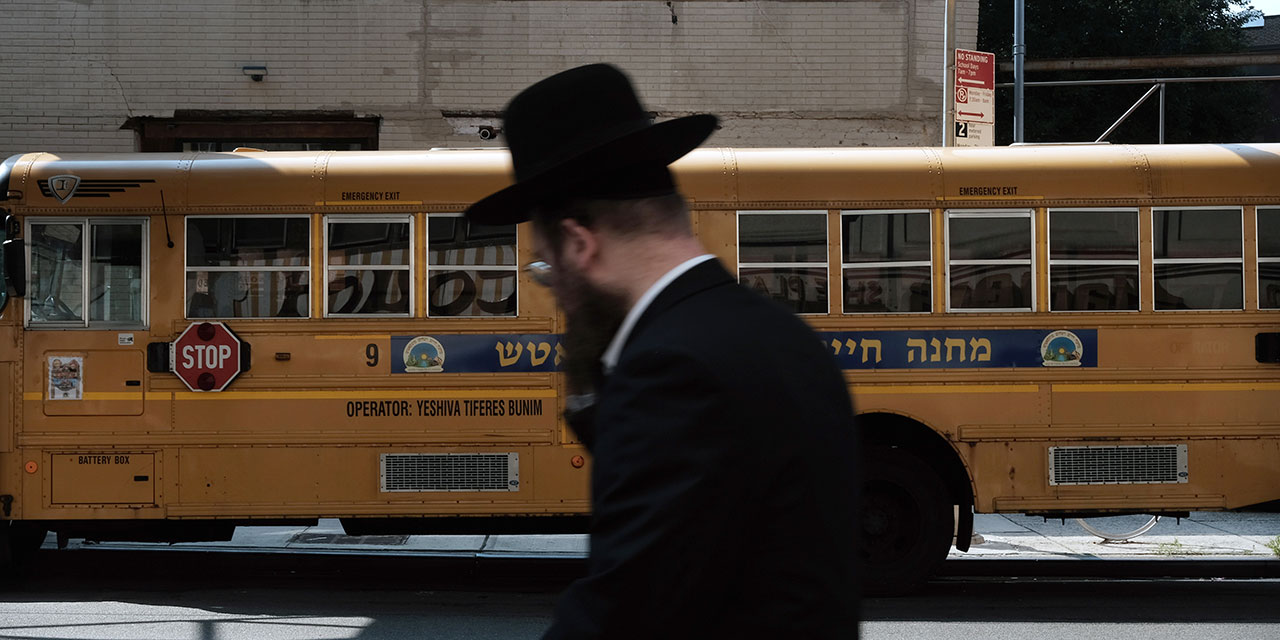Imagine a close-knit community whose members take care of and look out for one another; enjoy strong, tight-knit families with many children, close social ties, and a deep sense of purpose and belonging; and seem mostly exempt from crime, suicide, substance abuse, and other such problems. Are the habits and institutions by which this community prepares its members for adult life successful? Are its schools—which, after all, are one such institution—good schools?
Adult life has many dimensions, and schooling has many aims. Nonetheless, it would be hard to deny that some things are going very right in such a community. Yet the New York Times, in a recent blockbuster report, chose to attack one such community and its schools: the Hasidic community of New York—or rather, the Hasidic communities of New York, for there are many.
Finally, a reason to check your email.
Sign up for our free newsletter today.
It is important not to romanticize Hasidic life. No community is perfect, and even strong ones have members who suffer deeply, perhaps even because of those very structures that make them strong. Indeed, many Hasidic schools do have problems (and some stakeholders recognize them and want to fix them). If the Times had limited the scope of its report to such problems, then its treatment of Hasidic communities would be less objectionable: it is the case that Hasidic schools don’t do a great job of teaching math and English, and it is the case that many Hasidic schools don’t care about this shortcoming. Their priorities lie elsewhere.
To be sure, a weak secular education is not a necessary feature of these schools. As Eli Spitzer noted in the online journal Mosaic, non-Hasidic Haredi (or ultra-Orthodox) schools are similarly strict in their religious observance and circumscribed in their interactions with secular culture, yet offer both a muscular secular and religious education. Similarly, many of the strongest schools in New York are Orthodox, even if elite, Modern Orthodox prep schools are excluded.
But the Times did not find space to mention this in its 8,000-word report, published both in English and Yiddish as a helpful service both to Hasidim and to the Pulitzer Prize committee. This omission was almost certainly by design. The report seemed to take issue with the very existence of these schools and the culture in which they exist: they “wall [students] off from the secular world”; they “drill students relentlessly, sometimes brutally, during hours of religious lessons conducted in Yiddish”; a teacher “was told that he could not . . . discuss politics with his students.” A follow-up editorial accused Hasidim of failing to teach their children the skills needed to participate in democracy, while criticizing them for influencing New York politicians to leave them alone. Asks Ira Stoll in The Algemeiner: “If their schooling is as inadequate as the Times claims, how have they managed to be so politically effective?”
The Times report’s biggest elision is its failure to account for why parents choose to send their kids to these schools in the first place. Hasidic schools are private schools; the parents sending their children there could instead send them to public schools or non-Hasidic Haredi schools. Of course, some parents in these tight-knit communities might worry about ostracism. Many others may take issue with the poor quality of secular education provided in Hasidic schools, even if they are otherwise satisfied with the quality of these schools. But nothing suggests that most parents who send their kids to these schools are anything less than happy with them.
Over the last few years, schools have increasingly focused on “decolonizing” curricula and “culturally relevant” pedagogy. The same paper that brought us the 1619 Project has given warm coverage to such efforts. But support for culturally sensitive curricula should not just be limited to cultures that don’t offend the Times’s sensibilities.
Hasidim have tightly knit communities and tend to be happy, but this is not the reason they choose to be Hasidic. They choose to be Hasidic because they believe in certain things and profess certain values—beliefs and values that have been cultivated over centuries, if not millennia. It would be arrogant to reject these out of hand, and it would be problematic to justify support for Hasidic communities solely on the basis of our own standards of flourishing. Pluralists should support these communities even if the people in them were less happy, even if the families in them were less strong, even if their practices are, by our own lights, wrong. It is disconcerting for the Times to use its outsize influence to persuade the government to disrupt such communities. Tolerance is not tolerance if it extends only to things we like.
Photo by Spencer Platt/Getty Images
